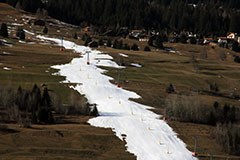News
Winter Olympics in Munich 2022? No comment
Aug 23, 2013
/
alpMedia
In just two months the citizens of several Bavarian municipalities will be deciding on their candidacy for the 2022 Winter Olympic Games, four days before the official deadline for applications. People seem reluctant to discuss the candidacy openly - does anyone actually want the Winter Olympics?

Image caption:
Should municipalities wish to stage the Winter Games, they have to guarantee that there will be snow, according to a rule of the International Olympic Committee. © CIPRA
Jacques Rogge, President of the International Olympic Committee (IOC) stated in mid-August: "I believe Munich would have a very good chance". A rare contribution to the discussion about the joint application by Munich, Garmisch-Partenkirchen and the Berchtesgaden region for the 2022 Winter Games. Bavaria is currently focused on the regional and national election campaigns - but no party wants to discuss the Olympics.
A referendum on the unknown?
A public discussion is a matter of urgency: residents of the municipalities concerned are being asked to give their opinion on 10 November 2013. In the event of a "yes" vote, the necessary documentation, plus the application fee, will have to reach the IOC by 14 November. It is unclear who is to decide by then on fundamental questions such as financing, as the parliaments in Bavaria and Berlin will only be re-elected at the end of September. The City of Munich, which is in favour of the Games, wants to inform its citizens about the project in good time, drawing on a budget of 560,000 euros. Axel Döring of the Nature Conservation League warns: "What we currently know about the application is wholly insufficient to judge its true extent". The vote is for an unknown quantity, which includes the Host City Contract.
Municipalities obliged to guarantee snow
The Host City Contract sets out the rights and obligations of the IOC and of the municipalities staging the Games. The contract has been described as a "gagging treaty" and as "immoral" among others like the civil law department of the City of Salzburg, a former candidate for the 2014 Winter Games. Thus the Committee can change the conditions, whereas the municipalities may not. In Sochi, for example, twelve further events were added following the signing of the Host City Contract. It is up to the organisers to provide the sports facilities and infrastructure. Furthermore, the municipalities are obliged to guarantee snow. A study by the German Alpine Club recently showed that, over 20 years, only 50% to 70% of the ski areas in Bavaria could guarantee snow - and this despite new water storage basins, snow cannons and snow deposits.
Little enthusiasm for the Olympics
In a recent interview, Jacques Rogge declared: "We want the Games to provide a legacy". Many people are however not so eager about such an inheritance: in March the people of Vienna voted by a majority of over 70% to reject an application for the 2028 Summer Olympic Games. Shortly after that nearly 53% of the population of Graubünden voted "no" to the 2022 Games. Now, two months before the deadline for applications for the 2022 Winter Games, there are no official candidates. In over four decades, interest in staging the Games has never been so low. Axel Döring warns against belief in hosting the Games in Munich, which are supposedly now to be had "on the cheap". Eco-friendly, democratic Games are not possible with the present Host City Contract. "The entire Alps should remain an Olympics-free zone", he says.
Sources and further information: www.tagesspiegel.de/sport (de), www.merkur-online.de/lokales/muenchen (de), www.nolympia.de/2013/08 (de)
A referendum on the unknown?
A public discussion is a matter of urgency: residents of the municipalities concerned are being asked to give their opinion on 10 November 2013. In the event of a "yes" vote, the necessary documentation, plus the application fee, will have to reach the IOC by 14 November. It is unclear who is to decide by then on fundamental questions such as financing, as the parliaments in Bavaria and Berlin will only be re-elected at the end of September. The City of Munich, which is in favour of the Games, wants to inform its citizens about the project in good time, drawing on a budget of 560,000 euros. Axel Döring of the Nature Conservation League warns: "What we currently know about the application is wholly insufficient to judge its true extent". The vote is for an unknown quantity, which includes the Host City Contract.
Municipalities obliged to guarantee snow
The Host City Contract sets out the rights and obligations of the IOC and of the municipalities staging the Games. The contract has been described as a "gagging treaty" and as "immoral" among others like the civil law department of the City of Salzburg, a former candidate for the 2014 Winter Games. Thus the Committee can change the conditions, whereas the municipalities may not. In Sochi, for example, twelve further events were added following the signing of the Host City Contract. It is up to the organisers to provide the sports facilities and infrastructure. Furthermore, the municipalities are obliged to guarantee snow. A study by the German Alpine Club recently showed that, over 20 years, only 50% to 70% of the ski areas in Bavaria could guarantee snow - and this despite new water storage basins, snow cannons and snow deposits.
Little enthusiasm for the Olympics
In a recent interview, Jacques Rogge declared: "We want the Games to provide a legacy". Many people are however not so eager about such an inheritance: in March the people of Vienna voted by a majority of over 70% to reject an application for the 2028 Summer Olympic Games. Shortly after that nearly 53% of the population of Graubünden voted "no" to the 2022 Games. Now, two months before the deadline for applications for the 2022 Winter Games, there are no official candidates. In over four decades, interest in staging the Games has never been so low. Axel Döring warns against belief in hosting the Games in Munich, which are supposedly now to be had "on the cheap". Eco-friendly, democratic Games are not possible with the present Host City Contract. "The entire Alps should remain an Olympics-free zone", he says.
Sources and further information: www.tagesspiegel.de/sport (de), www.merkur-online.de/lokales/muenchen (de), www.nolympia.de/2013/08 (de)





